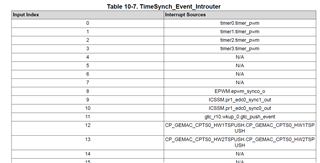I have successfully been able to implement a PTP pps out and a pps-gpio based PPS input on a SK-AM62.
If I am not mistaken, a GPIO based PPS has a certain level of inaccuracy due to the time the kernel needs to get to the point where ti timestamps the event.
I believe this can be improved with specific hardware support, and I think the SK-AM62 might have what's needed to do something like this.
I guess I have to somehow use CP_GEMAC_CPTS0_HW1TSPUSH, but I don't know exactly how.
Has anyone done anything like this before in this or any similar platform? Can someone help me understand what I should do to make this happen?




